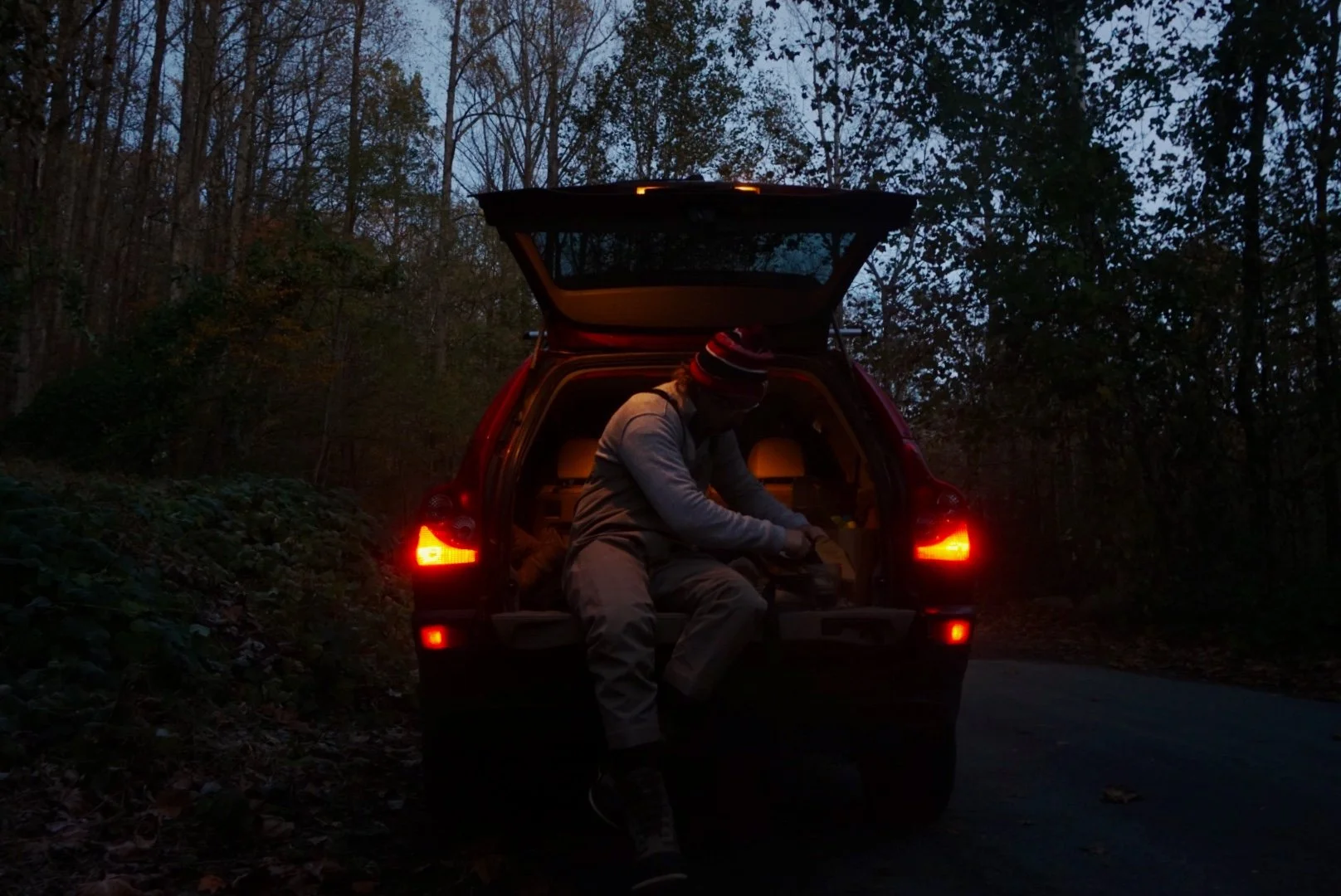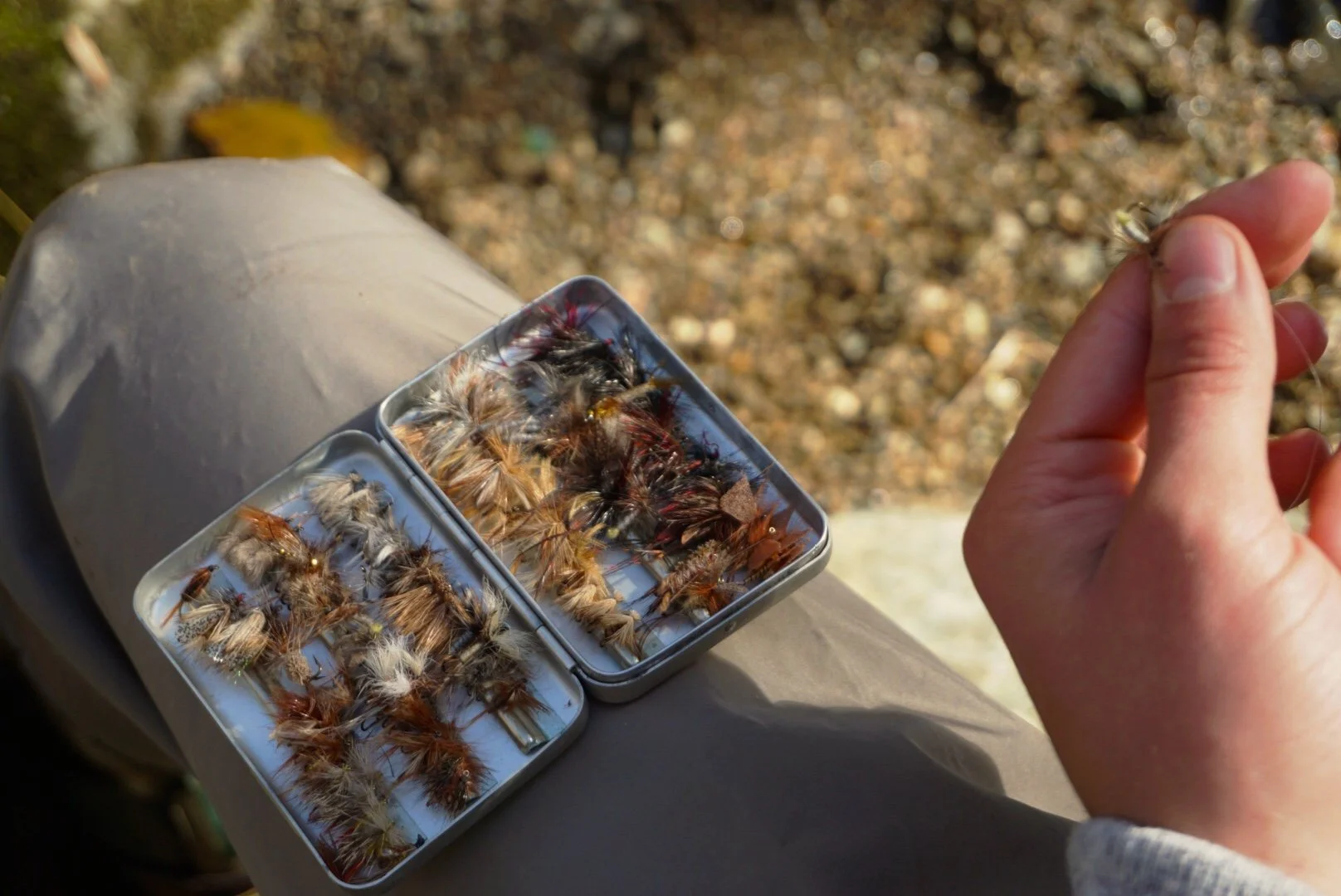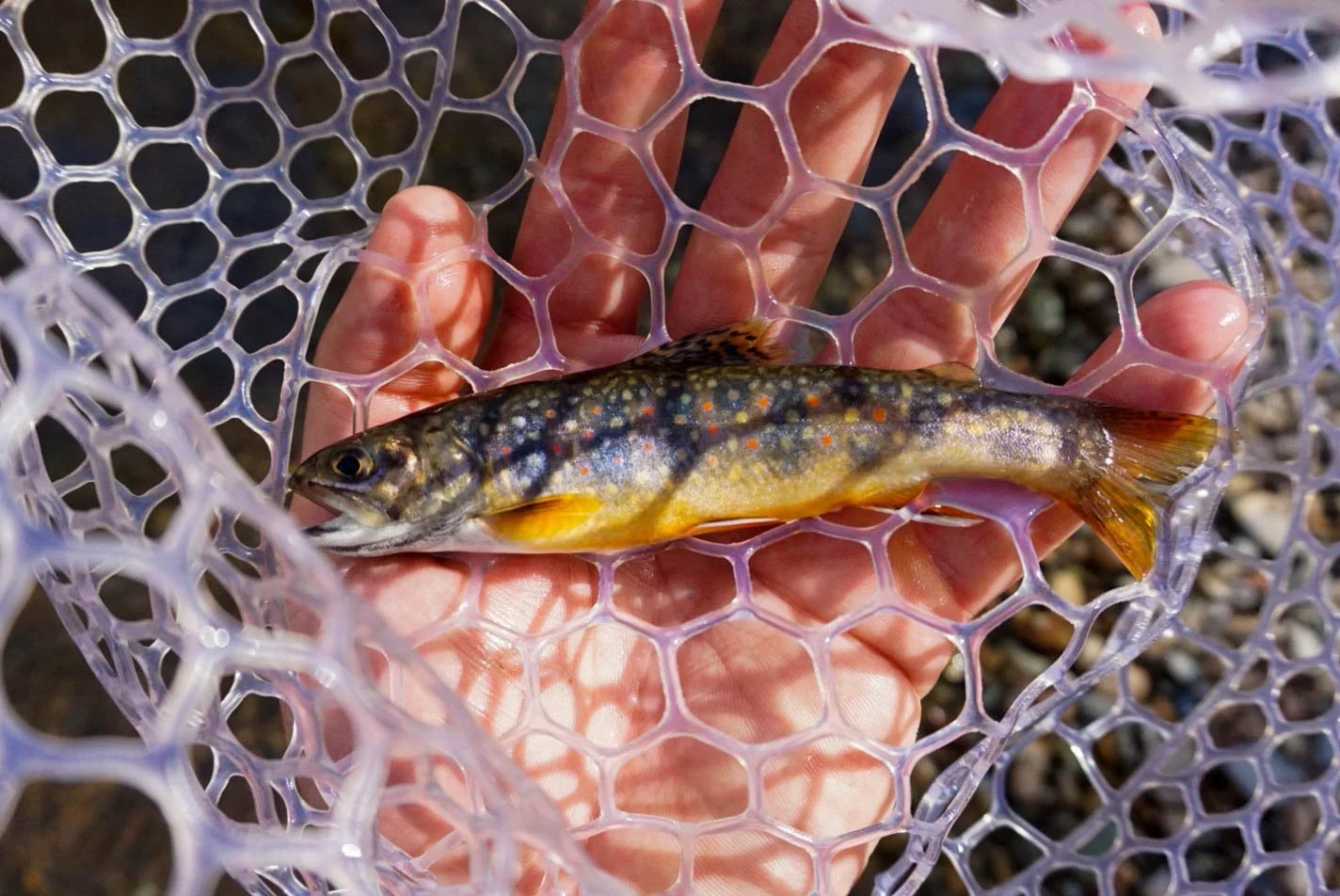Prettier In Water
We could see our breath when we got out of the car. “Do you think I need to put my jeans on under these?” My father asked, rubber chest waders wrapped around his ankles.
“Ya know by the time you’re actually walking around and what-not you’re gonna wish you didn’t have them on,” I told him, “waters not all that cold yet.”
By mid-summer Shenandoah National Park was closed to all angling, and to some it was already overdue. Blue Ridge Mountain streams that would typically flow and pool deep enough make you think twice before crossing had shrunk to puddles in a stairwell of dirt and pebbles. Crossing them in dry Chacos around late July I couldn’t help but wonder where the native brook trout could possibly shelter. I dreamt up deep pools that I knew didn’t exist along well traveled streams. I dreamt of a safe gullies where they’d slumber all day until the sun went down and then hit the dark top water with the jubilee of a cool mayfly hatch.
A streamflow chart of a section of the James River Basin via USGS Weather.
“You’re really not gonna eat it if we catch one?” He persisted.
“Nope,” I said proudly, “throw ‘em back today and they’ll be bigger tomorrow.”
I’d always thought of my father as the quintessential fisherman. On my desk is a photo album of his offshore endeavors up and down everything that touches the Chesapeake Bay, all the way out to the Gulf. He told me once that he’d caught enough fish through the years to fill up a pick up truck just with their eyeballs.
Beside that photo album is a tattered citation fading to yellow, eleven years old and he landed a chunky rainbow stocker at Hutchins Pond. Back then to get a citation at Conwell’s Sport Shop in Lothian, MD you had to prove your catch. Which he did, one of a half dozen dangling from his stringer. That night on his dad’s tailgate he learned to clean a trout and get out all the little bones that hide in the filet. They’d have them for dinner that night, all of them. As we always did in our house too. We never hunted what we wouldn’t eat and the same goes for what we reeled: rockfish (striped bass), croakers, spot, white perch, crappie, trout, the occasional catfish if my mom was out of town.
“Well if I catch one,” he poked, “I’m eating it.”
His first day of fly fishing began with trying to keep a gas station sausage gravy biscuit from plopping over the sides of a styrofoam tray in the passenger seat of my hatchback. No easy task going through the entrance of Shenandoah National Forest while the sun still tries to reach over the mountain.
I chose a spot without much of a hike in. It was my honey hole all spring. Could spend hours at one pool just watching that little hairy hook until the splash sent a jolt through seven and a half feet of fiberglass and nestled in the turbid seam of my chest. Even when I wasn’t catching I’d find myself just stopping for a sit and look around. Letting the splashing river wring out any stress I packed in. That’s where I wanted him to catch his first brook trout.
We started at the deepest pool I knew. Turns out I underestimated how cool the water had gotten in the valley by mid-October and that day was constantly reminded of such. He began so proud of the assortment of bushy dries and beaded nymphs he picked up at a yard sale over the summer. Not nearly as earnest on them as he watched them quietly drift from one end of the pool to the other, undisturbed.
We trekked over every fallen tree and pile of rocks he could hurdle. Some of the skinny water that I’d normally skip looked slow and deep enough to hold fish after the fresh storm. And they did. Several popped and splashed as his stimulator hit the water.
We’re still working on setting the hook.
“Now!” I hollered as softly as I could, as if they were listening to me from below the surface. After a few more botched hook-sets he insisted he’d walk along the path until he found a gentler clearing than the river rocks I was hopping along. The sun was finally high enough to look down upon the river and grace it’s still pockets with some warmth; which I knew would help our efforts but it also meant it was getting closer to when we had to meet the gals for lunch.
I took controlled steps on the mossy boulders. Picking and choosing where stable footing would let me hoist myself up. As I made it over another pool I found my father crouching behind a tree trunk. Flicking his Eagle Claw Featherlight more fluid than I’d seen all day. The line flowed as if it were a part of his arm itself. I watched him as he let it go, I waited with his stillness and leapt with his jerk of the rod toward the sun.
And that is where it’d stay.
A fishless barb clung to a cluster of leaves above him. He gave it an unsuccessful tug just as he saw me watching from below him. With a humble smile he pointed to the pool he stood behind. I signaled to stay put as I crouched over another set of rocks. When I stood tall the pool was at my chest, falling over its ledge no more than ten feet in front of me.
I short armed my first cast into the tumbling water and quickly retrieved my line before the elk hair caddis got snagged in whatever so many flies get caught on in the white water. I pulled a few more tugs of line out and flung to the head of the pool where the water curved around a perturbing rock as if it were a well-used dirt road. I can’t remember if it was the glare or the trembling water but I do remember that I set the hook not because of any splash or glimmer of orange fin, but seeing my father out of the corner of my eye hoisting his arms up in anticipated victory.
I pinched the line with my pointer finger and tilted upward to feel the undeniable tug towards darker water. I kept the rod above my head as I fumbled to common ground. There was no citation on the other end but it was honery enough to put on a brief show. I reeled slowly as my father asked again if I really had it. I bowed the rod tip behind me and dragged it close enough so he could net.
“Not all that bad for the first of fall,” I told him as he lifted his hand from the underside of the net. A brookie just a knuckle smaller than his hand . He tilted back and forth to see the sunlight shine her blue and red specks for the first time. In it’s back was a patterned topography map of the Blue Ridge Mountains weaving down its spine. It held steady on the bottom with us for a moment after he slipped it back into the seam.
“Even prettier in the water,” he said.
We sat on a down tree off to the side of that pool as he clamored over what vigor the trout gobbled up my fly. A man I’ve watched crank in tuna off the Gulf, a man who has billfish hanging above the fire mantle melted into an eleven year old boy at Hutchins Pond again with a six inch Brook trout in his hands. I unwrapped a couple turkey with mustard sandwiches and kept my eyes on the water as my father took long breaths of all that was around us. That was all he needed that day. His first Brook trout on the fly could wait until tomorrow.
We netted less brookies than I had expected. The angling wasn’t perfect, at times it was just a couple kids chuckin’ dries, but amongst plenty of strikes and shaky hook-sets there was a passage of the new season among us: soon the leaves, Brook trout bellies, and everything else would be bright orange. I pointed out where they’d soon be spawning and went on about how we have to tiptoe around the natives’ fragile space.
There is a romanticism to rainbows and browns of the west: shiny, sharp silver peaks, seemingly boundless river systems, reel battles rooted in brute force. The vastness of them is what lures us. Brookies are Appalachia. Worn and rounded by years of silt and timber. Catching a brook trout in an Appalachian stream is as close as us East Coasters will get to life before folks started tinkering with every bit of woods they could touch. For such a fragile little fish the brookies have fought through enough timbering, acid rain, and 6x tippet to make any salmonid proud (even if it is technically a char). They were here first, and with any luck they’ll be here last.
Published by FLYLORDS






